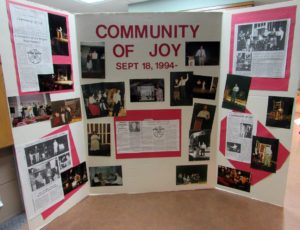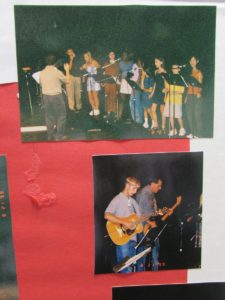Nine: A Special Joy

Display Board for Lay Ministry program 1999
As the twentieth century drew to a close, members of First Methodist were invited to attend a Lay Ministry Appreciation evening in the fall of 1999. Each year at least one campaign took place to recognize the large variety of church ministries and recruit church members into service. Among the displays was one created by members of the Community of Joy mission. Spread across three folding cardboard panels, the exhibit celebrated the history of this novel outreach in discipleship.
In 1990, First Methodist program staff and members of the Council of Ministries began considering the idea of an alternative church service, unlike the standard ones occurring every Sunday. This new effort would not replace traditional worship. Rather, it would provide an option, a “mission outreach,” to attract the “unchurched, ” those folks less likely to venture into a conventional church service.

Community of Joy Worship Bulletin with COJ logo
The vision finally became reality on September 18, 1994. The mission design team chose the name Community of Joy for this new venture with the desire of making that phrase “an identifying reality for the service.” Services would be held at Midland Community Theater on Wadley Avenue and take advantage of that venue to provide drama and contemporary music.
That first Sunday morning began with a pre-service concert. Associate Pastor Mark Alexander welcomed those in attendance, then a music team took the stage to lead the group in songs of praise. Following the offertory, Chris Olsen and Alathea Blischke were the cast for “An Hour on Wednesday,” a short dramatic presentation with a spiritual message. Tanya Eustace played for a time of music meditation and Reverend Alexander then delivered the message. Though the attendance was small, everyone involved felt the venture had begun successfully.
COJ, as it was often affectionately labeled, became a regular part of First Methodist Sunday morning worship. The praise band Joyful Noise, directed by David Thomas, usually with eight to twelve musicians, provided contemporary music that was “very 90s.” The Rio Wadley Players, directed by Delanna Thomas, performed the dramatic scripts, either produced locally or purchased from national script services.

Snapshots of COJ worship
